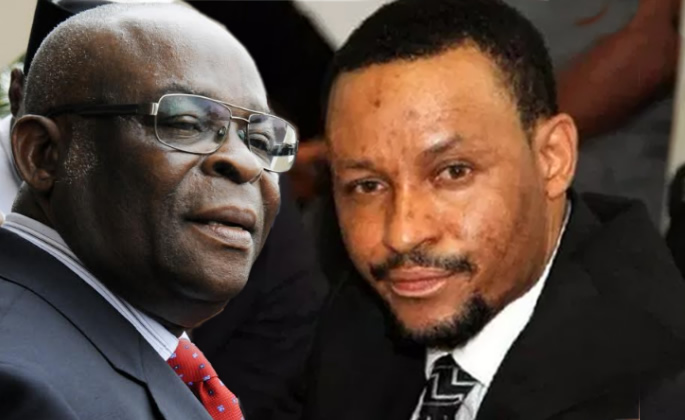The suspended Chief Justice of Nigeria, CJN, Justice Walter Onnoghen, Monday, opened his defence to the allegation that he failed to declare his assets as prescribed by the law.
Onnoghen kick-started his defence to the allegation, following the decision of the Code of Conduct Tribunal, CCT, in Abuja that he has a case to answer with regards to the six-count charge the Federal Government preferred against him.
FG had in the charge, alleged that Onnoghen’s failure to properly declare his assets was in violation of section 15(2) of Code of Conduct Bureau and Tribunal Act.
The Danladi Umar-led three-member panel tribunal had in a ruling last Friday, declined to discharge and acquit the defendant, insisting that he has explanations to give with respect to the allegations.
FG had earlier closed its case after it called three witnesses that testified before the CCT.
Consequently, sequel to directive of the tribunal, the embattled CJN, said he would also call three witnesses to establish his innocence.
In his Evidence-In-Chief, DW-1, Mr. Lawal Busari, the first defence witness, a driver at the Supreme Court, told the tribunal that he was the one that drove the defendant to the Code of Conduct Bureau, CCB, the day he collected his asset declaration form.
Led in evidence by Onnoghen’s lawyer, Chief Adegboyega Awomolo, SAN, the witness, said: “On July 28, 2010, my lordship called me to take him to the CCB office at Asokoro. When we got there, he collected asset declaration forms. After the form was given to him, he said Alhaji, are you not collecting your own?
“He said, collect it, and I did. We came back to the office, I filled my own too. On November 4, 2010, he gave me N200 to pay for the asset declaration form. The second day, I did my own too and paid the cashier N200 at the FCT High Court.”
Though the prosecution counsel, Mr. Aliyu Umaru, SAN, opposed the tendering of the receipt in evidence, he was however, overruled by the tribunal.
The CCT Chairman admitted and marked the receipt as an exhibit in the trial.
Continuing his testimony, Busari said: “After payment at the FCT High Court, we went and submitted the form, myself and your lordship, at Asokoro office of the CCB. It is a woman, fair in complexion that received the form. I cannot remember her name, but she received both forms.
“The form was not acknowledged that day. The woman said we should come back to collect the acknowledgment copy.”
The witness said he subsequently went back to the CCB alone and collected the acknowledged form.
Under cross examination, the prosecution counsel queried Busari if he was reading from a piece of paper.
Upon the admission of the witness that he was indeed holding a piece of paper in his hand, the tribunal Chairman, demanded that the paper should be brought to him.
After the CCT Chairman had read through the paper, the prosecution counsel requested that it should be returned back to the witness.
Asked who wrote and gave him the paper, the witness said: “My Lord I wrote it myself. It is my hand writing and it contained facts about me.”
Application by the prosecution to tender the paper in evidence was not opposed by the defence lawyer.
It was therefore, admitted in evidence and marked it as exhibit 7.
He described Justice Onnoghen as a good man, saying he was attached to the defendant as a driver when he was still a Justice of the Court of Appeal.
Meantime, Justice Onnoghen has persuaded the tribunal to issue subpoena to compel a Director at the CCB, Mrs Theresa Nwafor, to appear as his second witness.
The proposed witness is currently serving at the CCB office in Edo State.
Mr. Umar therefore adjourned the case till Wednesday to enable the witness to appear and give evidence in the trial.
Meanwhile, lead counsel to the CJN, Awomolo, SAN, had alleged interference of the executive arm of government in the proceedings before the CCT.
In a statement after the proceeding, Awomolo said: “A situation where the Executive arm is the custodian of the Code of Conduct for public officers, the enforcer of the Code of Conduct through the Tribunal. It is the appointing authority of the members of the Tribunal.
In the proceedings in the Tribunal, the executive is the accuser, the investigator, prosecutor, the witness and the judge, all roll together into one.
“This is unacceptable under the Constitution that guarantees independence of the three arms of government. There is urgent need for Constitutional reform.
“The CCT must have courts established in each of the six geopolitical zones of Nigeria. Monopoly has the ability to breed corruption, arrogance, disregard for the due process and partiality.
“The CCT should be a full member or part of the judiciary under Section 6 of the Constitution of the Federal republic of Nigeria, 199? (as amended).
“The third lesson is that the case has clearly shown that Nigerian judiciary is very weak, vulnerable and not independent. The security of tenure of a judicial officer is a mere wishful thinking.
“It is unthinkable that the head of the judiciary will be treated the way Onnoghen was treated and not a whimper came from the body of men and women of highest distinction in the legal profession. Is it not dangerous that the President can appoint a Chief Justice without the recommendation of the National Judicial Council, NJC?
“Whereas political matters and election maters were treated with dispatch, and judgment delivered within hours, the appeal of the Chief Justice of Nigeria, six weeks after argument was ordered to be kept away in the file.”

